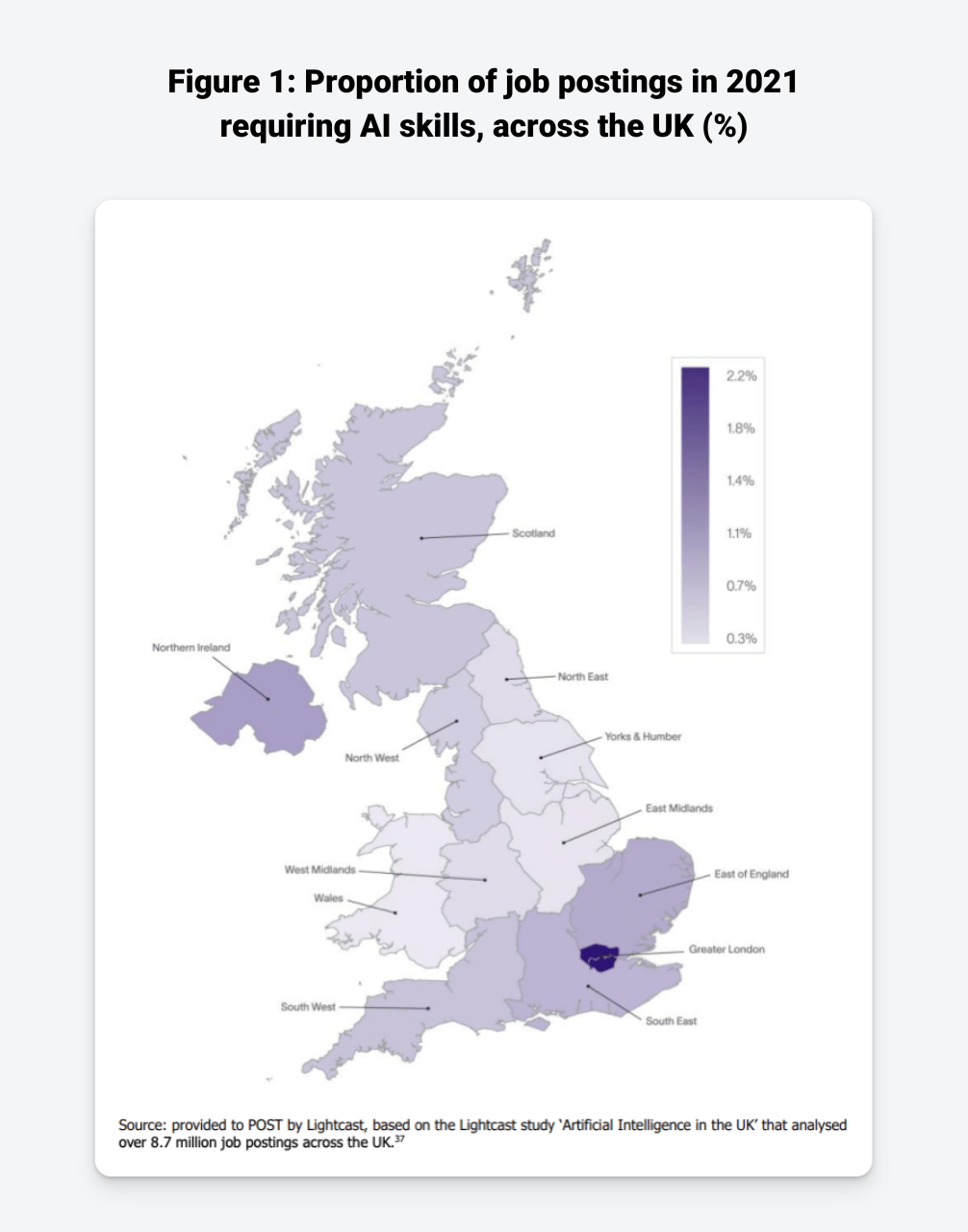In the life sciences industry, which has been marked by a traditionally slower pace in digital adoption compared to sectors like banking, a notable shift is underway. The digitalisation of the industry, though gradual, has gained momentum, propelled even further by the catalysing effects of the global COVID-19 pandemic.
A key player in this transformative journey is the data scientist, a role that is a relatively new addition to the research and development (R&D) landscape within life sciences. The surge in demand for data scientists has become a global concern. The U.S. Bureau of Labor Statistics predicts that there will be approximately 11.5 million job openings in data science by 2026.

As the life sciences industry continues to become an increasingly important aspect of modern medicine, the industry itself is evolving enormously. With such growth and importance, a critical challenge has emerged: the widening skills gap. As the industry pivots towards a future defined by data-driven insights and a reliance on AI for pattern-recognition and diagnoses, the demand for skilled data scientists has reached unprecedented heights.
This article explores the complexities of the skills gap, examined the evolution of the life sciences industry and pinpointed the burgeoning trends driving the demand for data scientists.
Understanding the skills gap
The life sciences industry has undergone a dramatic transformation over the last decade, evolving from traditional methodologies to a landscape driven by cutting-edge technologies, artificial intelligence, and data-driven insights. Understanding the historical context of this industry provides valuable insights into the current skills gap and the rising demand for data scientists.
Historically, life sciences have been rooted in meticulous laboratory work and observation. However, recent decades have witnessed a seismic shift with the integration of advanced technologies. The introduction of high-throughput sequencing, advanced imaging techniques, and omics technologies has brought in an era where massive volumes of data are generated at unprecedented rates. This surge in data has created both opportunities and challenges, forming the basis of the current skills gap.
Data-driven approaches have become integral to every facet of the life sciences, fundamentally altering how research is conducted, products are developed, and decisions are made. Researchers now leverage data analytics, machine learning, and artificial intelligence to extract meaningful patterns and insights from vast datasets. This shift not only expedites the drug discovery process (which without AI intervention, can take 12–15 years before a drug receives regulatory marketing approval) but also enables personalised medicine by tailoring treatments to individual genetic profiles. The impact of data-driven decision-making is felt across the entire life cycle of pharmaceuticals, from early-stage research to post-market surveillance.
Simultaneously, the growing significance of data science is evident across various industries, with life sciences standing out as a key beneficiary. Data science transcends traditional boundaries, offering solutions to complex challenges through interdisciplinary approaches. In life sciences, the amalgamation of biology, chemistry, and data science has unlocked unprecedented possibilities. Precision healthcare, an emerging trend, exemplifies this synergy, in which data-driven insights enable highly targeted and personalised medical interventions, improving patient outcomes and minimising adverse effects.
Within the life sciences domain, specific trends underscore the increasing reliance on data science. Personalised medicine is one such trend where treatment plans are adjusted according to each patient's unique characteristics, making it more effective. Another trend is in drug discovery, where smart computer programs predict possible new drugs and make clinical trials more efficient. Precision healthcare is a shift in thinking, moving away from one-size-fits-all approaches to focusing on individualised care plans for each patient.
The demand for data scientists
The life sciences job market is well into its transformative shift, with data science emerging as a critical component in driving innovation, efficiency, and strategic decision-making. In recent years, there has been a notable surge in the demand for data scientists within the industry, reflecting the industry's recognition of the immense value data-driven insights bring to research, development, and operational processes.

Indeed, the demand for data scientists isn’t limited to the life sciences sector either. In 2021, a survey conducted by Opinium Research revealed that among 1,045 UK businesses, 48% were actively seeking candidates for positions that required data expertise, covering a range of skills from basic IT skills to programming.
In 2023, another survey (conducted by the World Economic Forum) encompassing 803 global companies revealed that roles such as 'AI and Machine Learning Specialists' and 'Data Analysts and Scientists' were among the top 10 positions anticipated to experience rapid growth between 2023 and 2027.
The demand for data scientists in life sciences has experienced a substantial uptick and this growth is driven by the industry's increasing reliance on data to navigate complex challenges. As pharmaceutical and biotechnology companies adopt more sophisticated technologies and generate vast amounts of data, the need for skilled professionals who can extract meaningful insights from this data has become paramount.

Due to the importance, and the complexity of the data science role within the life sciences sector, data scientists must possess a unique set of skills. These skills extend beyond traditional data analysis capabilities and necessitate a deep understanding of the specific challenges and intricacies inherent to life sciences. Skills and experience often specifically needed include:
-
Bioinformatics expertise – data scientists need to be well-versed in bioinformatics, understanding how to analyse biological data, sequence information, and molecular structures. This expertise is crucial for advancements in genomics, personalised medicine, and drug discovery.
-
Regulatory compliance knowledge – given the highly regulated nature of the life sciences industry, data scientists must be familiar with regulatory standards and compliance requirements. This includes understanding data privacy regulations, ethical considerations, and industry-specific compliance frameworks.
-
Domain-specific insights – data scientists need a nuanced understanding of life sciences processes and workflows. This includes familiarity with clinical trial design, pharmacovigilance, and healthcare data management.
Why is data science being relied upon in life sciences?
The employment landscape for data scientists is experiencing an unprecedented surge, with the US Bureau of Labor Statistics projecting a staggering 36% growth from 2021 to 2031, far surpassing the average growth rate of 5%. This dramatic increase is a testament to the crucial role data science plays in various industries, particularly in the life sciences sector.
Reports indicate that deep learning techniques are already achieving above-human diagnostic performance in certain cases, signifying a remarkable advancement in the field. However, the true potential of this area is yet to be fully realised, and as these techniques are refined over time, their transformative impact on the life sciences industry is poised to become even more profound.
So, what makes data science so much better than the old, traditional methods? We’ve identified four key areas in which modern advancements and data science excel over human performance:
-
Predicting trends – one of the primary reasons data science is indispensable in life sciences is its ability to predict trends. Through the analysis of vast datasets, data science has proven instrumental in forecasting the spread of diseases like COVID-19. By leveraging advanced analytics, the public health sector can mount more effective responses, minimising the impact of outbreaks. Machine learning also enables data scientists to detect intricate patterns in molecular-level cancer growth, facilitating personalised therapies. These analytics not only enhance treatment specificity but also contribute to the broader field of medical research.
-
Quality control – in the life sciences industry, quality control has been significantly improved by data science. Using random and controlled methods in experiments and analyses, data science helps reduce biases during pre-clinical testing and clinical trials. Algorithms play a crucial role in identifying potential issues with quality control, making scientific research and development more accurate and reliable. This careful approach leads to better outcomes for patients, as therapies and treatments undergo more thorough examination and scrutiny.
-
Cost and risk reductions – data science is a powerful ally in reducing risk and cost within the life sciences industry. During the COVID-19 pandemic, machine learning algorithms played a crucial role in identifying at-risk populations and optimising vaccine distribution. This not only reduced the risk of infection among vulnerable groups but also streamlined the cost of widespread vaccination efforts. In personalised therapies, data science aids in predicting the specificity of target drugs, minimising the risk of adverse effects, and making these advanced treatments more accessible and affordable.
-
Future growth opportunities – as data science rapidly evolves, a few important areas are influencing the future of the life sciences industry. Data visualisation platforms, automation of data processing, and improving how we predict outcomes are becoming more popular. The need for data scientists with interdisciplinary expertise, blending hard skills from disciplines like computer science with essential soft skills, is increasing. This demand demonstrates the critical role data scientists play in driving innovation and improving healthcare outcomes.
Data science has become an indispensable force in the life sciences industry. From predicting trends and reducing risk and cost to ensuring quality control and identifying prospective growth areas, data science is a linchpin in advancing medical research and improving healthcare outcomes worldwide. As the field continues to evolve, the opportunities for data scientists to make meaningful contributions to the life sciences industry are bound to grow exponentially.
Finding great data scientists
Understanding how complex and important a job data science plays in the life sciences sector, it’s essential to find the best data scientist for your needs. Finding great data scientists requires a keen understanding of the unique qualities that make an individual excel in this field.
A standout data scientist possesses a combination of technical expertise, analytical thinking, and effective communication skills. Technical proficiency in programming languages such as Python or R, proficiency in handling big data tools, and a strong foundation in statistical and mathematical concepts are essential.
Beyond technical skills, a great data scientist demonstrates curiosity and a proactive approach to problem-solving, constantly seeking innovative ways to extract insights from data. Adaptability is key, as the field evolves rapidly, requiring individuals who can keep pace with new technologies and methodologies. Effective communication skills are also vital for translating complex findings into actionable insights for non-technical stakeholders.
A great data scientist not only excels in handling data but also possesses the ability to bridge the gap between technical and non-technical teams, making their contributions invaluable to the success of data-driven initiatives.
Here are some of the key skills that a data scientist in the life sciences industry might need and are commonly found on job listings:
-
Bioinformatics expertise – a proficiency in analysing biological data, sequence information, and molecular structures. This will also necessitate the candidate to have experience with bioinformatics tools and databases.
-
Data analysis and visualisation – strong skills in analysing large datasets relevant to life sciences research. Candidates will also need to be proficient in data visualisation tools such as Tableau or Power BI.
-
Machine learning and statistical modelling – experience with machine learning algorithms and statistical modelling techniques is likely to be an ‘essential’ for most roles. Those with experience in the application of predictive modelling in areas like drug discovery or personalised medicine, will stand out from the crowd.
-
Regulatory compliance knowledge – familiarity with regulatory standards and compliance requirements in the life sciences industry is becoming increasingly important. Candidates ought to have a thorough understanding of data privacy regulations and ethical considerations.
-
Domain-specific insights – in-depth understanding of life sciences processes and workflows is essential. Knowledge of clinical trial design, pharmacovigilance, and healthcare data management will be required for almost all life science roles.
-
Programming skills – proficiency in programming languages such as Python or R will commonly be essential for successful candidates. Experience in handling big data tools like Hadoop or Spark will also set candidates apart.
-
Data cleaning and pre-processing – skills in cleaning and pre-processing complex datasets are needed routinely for refining AI models and for training AI. The ability to handle and transform raw data into usable formats will be integral for a role in life sciences.
-
Collaboration and communication – effective communication skills are needed to translate complex findings for non-technical stakeholders. Collaboration with interdisciplinary teams should be expected with candidates having to bridge the communication gap between technical and non-technical roles.
-
Adaptability and continuous learning – those with the ability to adapt to rapidly evolving technologies and methodologies in data science will cope well in the life sciences sector. A proactive approach to continuous learning and staying updated on industry trends is desirable to develop an agile and cutting-edge team.
-
Problem-solving and critical thinking – a candidate who demonstrates curiosity and has a proactive mindset towards problem-solving is hugely beneficial when developing training models. Critical thinking skills are needed to approach data challenges and extract meaningful insights.
-
Knowledge of omics technologies – understanding and experience with omics technologies (genomics, proteomics, etc.) is another desirable trait. Candidates with experience in aomics data in research and analysis will strengthen a team.
-
Experience in clinical data management – frequently listed in role requirements is the need for familiarity with handling and analysing clinical trial data. Knowledge of data standards and best practices in clinical data management is important in this industry.
Get support recruiting your data scientists
If your company is looking to enhance its team with skilled data scientists in the field of life sciences but requires assistance in finding the perfect candidates, Hamlyn Williams is here to provide expert recruitment support. As a team of seasoned executive recruiters, we possess a deep understanding of the challenges and demands unique to the life sciences industry.
Our approach is tailored to collaborate closely with you in defining the specific roles your team requires. From there, we leverage our industry insights and expansive network to identify and present suitable candidates for your consideration. Our extensive experience in placing highly skilled data scientists with expertise in bioinformatics, regulatory compliance, and domain-specific insights sets us apart.
Hamlyn Williams is dedicated to streamlining the recruitment process, ensuring that you connect with top-tier automation talent that aligns seamlessly with your company's goals and requirements in the ever-evolving landscape of life sciences.
Don’t forget
The field of data science is at the forefront of transforming the life sciences industry, and Hamlyn Williams is leading the charge in recruiting top-tier talent to drive this evolution towards automation. The life sciences sector, historically slower in adopting digital technologies, is now undergoing a rapid digitalisation, accelerated by the catalysing effects of the global COVID-19 pandemic. As the industry pivots towards a future defined by data-driven insights and AI-driven advancements, the demand for skilled data scientists has reached unprecedented heights.
These professionals play in critical role in driving innovation, efficiency, and strategic decision-making within the life sciences sector. The surge in data science job openings highlights the industry's recognition of the immense value that data-driven insights bring to research, development, and operational processes.
In the dynamic landscape of life sciences, Hamlyn Williams stands as a strategic partner, offering expert recruitment support to companies seeking skilled data scientists. With a focus on bioinformatics, regulatory compliance, and domain-specific insights, Hamlyn Williams ensures that its recruitment process is tailored to the unique needs of the life sciences industry. By bridging the gap between technical expertise and industry demands, Hamlyn Williams connects companies with top-tier data science talent, fostering innovation and contributing to the advancement of medical research and healthcare outcomes.
Is your company is looking to enhance its team with skilled data scientists in the evolving field of life sciences? Hamlyn Williams is committed to providing tailored recruitment solutions so get in touch to find out how we can support you with your hiring needs.














